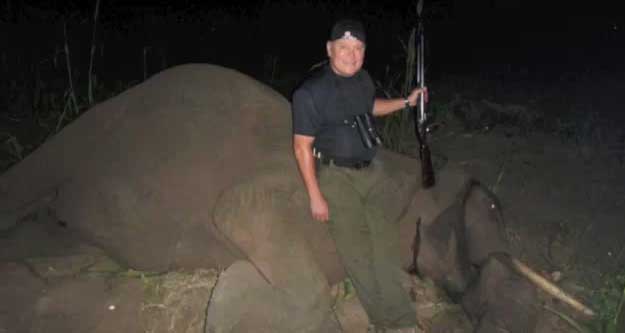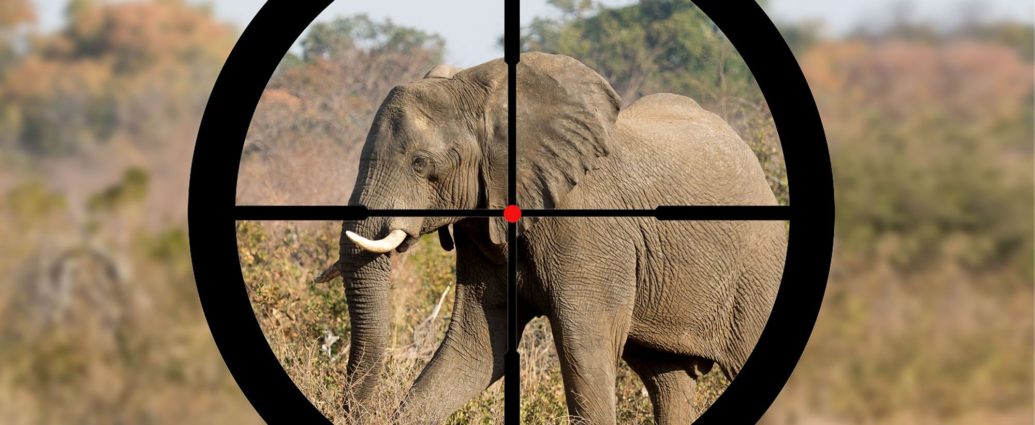
Teddy Roosevelt next to an elephant on safari, circa 1900. From Corbis.
Last week, the impetuous billionaire and Go Daddy C.E.O. Bob Parsons placed himself at the center of an unusual public controversy. He posted a video on his Web site that shows him fatally shooting an elephant during a recent hunting excursion in Zimbabwe. The images circulated widely over the Internet and through TV news, where angry commentators criticized Parsons for acting irresponsibly and inhumanely.
When I first saw the footage, my reaction was less emotional. I simply concluded that Parsons was a fool for ever presuming the video would generate a positive response. The heroism of rich white men shooting elephants, Parsons failed to recognize, is a romantic colonial notion the world rejected long ago. And what’s worse is that the hunting images include scenes of hungry African villagers struggling against one another to carve off pieces of meat from the fallen elephant’s carcass. Parsons’s camera noticeably records the frantic scene from above, reflecting yet again the complex and divisive class issues inherent in the colonial-style hunt.
While scanning coverage of the incident, I also noticed that almost no attention has been given to the cost of undertaking such exotic hunts. I have no way of knowing what Parsons actually paid to take down his elephant, but comparable safaris typically cost tens or even hundreds of thousands of dollars. In fact, it isn’t uncommon for an avid big-game hunter to spend $500,000 a season on African trophies alone. And with each passing year, as the laws protecting wildlife become increasingly strict, these remaining hunts only rise in value. They are unquestionably a wealthy man’s pursuit.

Interestingly, some upper-class hunting enthusiasts dismiss Parsons’s assault on the elephant as a cowardly excuse for a genuine safari. People say that his method of waiting for a wild animal to come feed on domestic crops—he bided his time undercover until his elephant [arrived?] to graze on planted sorghum—is equivalent to strategically baiting animals, which normally carries pejorative connotations among affluent sportsman. Parsons, meanwhile, while defending his actions, has cited the grave danger he faced on the hunt from the oversize beasts potentially charging him in a violent stampede. One devoted hunter I know summed up the entire incident in the following cynical terms: “It has everything,” he said. “A rich fat American paying for a ‘canned hunt,’ pretending he is doing it as an act of condescending kindness, starving Africans behaving uncontrollably. It really nails all the great stereotypes.”
Personally, I don’t support killing big game in Africa, even if—as Parsons claims—the local population endorses such behavior. From an environmental perspective, it simply doesn’t feel like a responsible enterprise. I can appreciate, however, that occasionally wildlife populations need to be managed, and hunting seems like a perfectly reasonable method of achieving that end. I disagree with Parsons’s decision to kill an elephant in Zimbabwe, but I can’t say I dismiss altogether the logic he uses to justify that decision. (Still, since elephants are an endangered species, the need to manage their population is open to debate.) What’s more troubling for me is that he somehow thought his ridiculous home movie of the experience would appeal to people, and he neglected to perceive the offensive classist message the imagery conveys. Parsons is unable grasp that the tradition of rich Westerners doing foolish things in Africa doesn’t need any more encouragement.
The One Percent
by Jamie Johnson
Via: Vanity Fair


He has to be a meat eater!